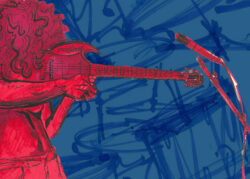Although Have Mercy’s 2017 album is entitled Make the Best of It, it hardly centers around hopeful, uplifting themes that resonate with the idea of “making the best” of a bad situation. Contrarily, the emphasis of the album is on the painful nostalgia that comes with living solely in the past. Like Have Mercy’s previous albums, Make the Best of It is heavily focused on heartbreak and failed love, offering a rose-colored perspective of toxic relationships and unhealthy lifestyles. Like that of many post-hardcore punk bands, Have Mercy’s music plays with a romanticized view of depression by making uncaring sadness paired with the use of drugs and alcohol seem poetic. This album is no exception to the rule and tends to put a strong focus on past loves rather than on greater issues of creating one’s identity or actually dealing with depression.
In this case, it is fair to judge an album by its cover. Make the Best of It’s cover art shows a couple hiding away in a dark room while the natural light from outside creates a dim glow. The two appear apathetic as they lay in bed, the boy smoking and the girl’s face hidden. The room itself is messy with books that line the floor, a record player, and a half empty wine glass. This cover tells a story of two young people who are escaping the world with each other and drugs. The music itself continues this thought; however, the girl is no longer present. The boy is smoking alone in the room and reminiscing about his times with her.
The album intentionally reflects a hazy perspective. The first song, “Smoke and Lace” sets the mood, the title itself creating the image of a clouded atmosphere while the lyrics speak of all the things that the singer, Brian Swindle, can’t remember. Throughout the remaining thirty-five minutes of the album, he repeatedly talks about smoking, taking drugs, and drinking too much which all likely contribute to his generally blurred view of the past. Because of this, he can only see the good in his memories, glossing over the bad parts and holding fast to all the people and places that he misses.
The romanticization of unhealthy relationships is a clear theme on this album. The lyrics consistently reference Swindle’s urge to go back and relive times spent with women who did not treat him well. In “Drive”, he sings about a girl who repeatedly woke him up in the middle of the night to pick her up but always refused to tell him where she was. Likewise, in “Disagree” he sings about a girl who always thought she was better than him and only finds happiness in “ignorance and bottles”. Whether or not this is the same girl is unclear, but the girls are not the only problem. The singer himself is depressed and has attachment issues. In a grieving lyric from the slowed down “Ghost”, he begs his love to “attach to me and I’ll be your host.” This parasitic imagery starkly exemplifies this pattern of unhealthy relationships. Nevertheless, Swindle continues to sing about missing this part of his past.
The most frightening song on the album is undoubtedly “Reaper” in which the singer uses murderous metaphors to exaggerate his emotional pain. “Reaper” tells the story of a man who was left by the woman he loved because he was “confused and always angry.” When he finds out that his ex-girlfriend has started to date someone new, he stalks the new lover and claims to have “cut the breaks on his Camaro” so he “won’t make it home.” However, throughout the song, he constantly compares himself to this new lover, claiming that they have the same messed-up look that she left him because of in the first place. When he accuses the new lover of finding a sick satisfaction in the woman’s tears without any real reasoning, he is likely revealing his own manipulative tendencies. Unlike most of the songs on this album that reflect a glossier view of the past, “Reaper” demonstrates raw pain rather than wistful nostalgia. It might be creepier conceptually, but it offers a change of scenery on an album that harps over old memories.
The only song that shifts gears is “Good Christian Man,” which was released as a single before the full album. “Good Christian Man” is about Swindle’s attempt to be a good person which is seemingly thwarted by his inability to live up to society’s high expectations. In the music video, Swindle is singing in the middle of a church while the people in the pews berate him with signs that say things like, “You’re worthless” and “Disappointment”. While on the surface the song seems to be about the simple fact of being imperfect, especially in the context of Christianity, it runs deeper than that. The chorus repeats, “To be loved and feel hated still” and “Don’t give up”—two lines that could reveal underlying mental illness. The likely situation is that society does accept Swindle while he does not accept himself. Thus, although he is loved, he only feels self-hatred and interprets it as coming from the outside world. The added “Don’t give up” creates space for the album title, Make the Best of It, as Swindle encourages himself and listeners to persevere through hard circumstances.
Ultimately, Make the Best of It is neither an exceptional album nor a terrible one. The music is catchy, but it does not vary much within the album. The same cleaned-up guitar riffs and drum patterns become monotonous after a while. The sound gets slightly coarser in songs like “You Made Me” and “Reaper” and more energetic in “Begging for Bones,” but, overall, it mostly blends together. The combination of mediocre melodies and repetitive nostalgic lyrics make for an average album.
Although Have Mercy’s Make the Best of It is not extraordinary, it is still worth a listen. Most of the lyrics are straightforward, but they contain interesting, though often sad, messages about love, innocence, and moving on. Thematically, it is difficult to listen to an album that looks back on the past with such opaque rose-colored glasses but offers no clear sign of change or moving on. There is no real progression toward something better. In the music video for “Coexist”, Swindle is shot and killed by a girl wearing heart-shaped, pink-tinted sunglasses. This is a metaphor for the entire album: nostalgia and past loves are killers. In other words, reliving old memories is not a healthy way to live. Perhaps ironically, this album truly shows the exact opposite of “making the best of it.”
Image Credits: PicsArt






